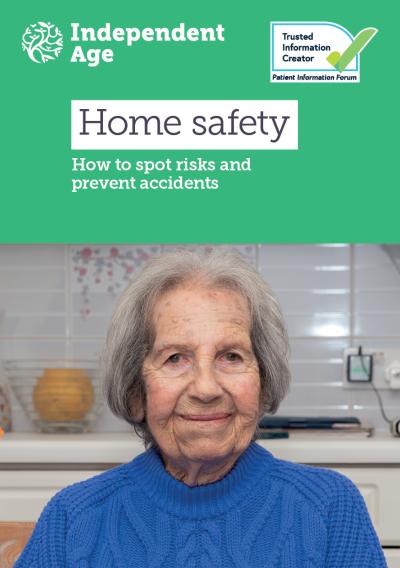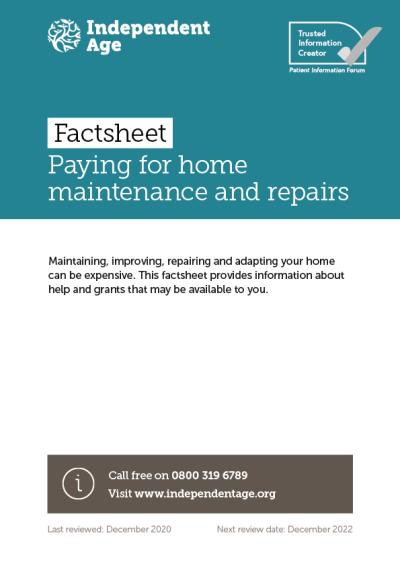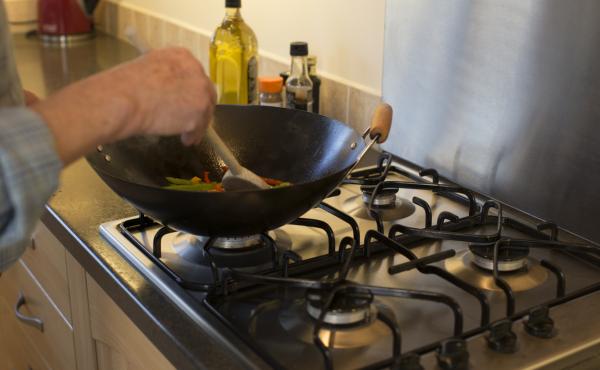Related publications

Home safety


Take steps to protect yourself from fire, gas leaks and carbon monoxide poisoning, and make sure that all your appliances are safe to use. There are some simple checks you can do yourself. You can also get help and advice.
Fires can start suddenly and spread quickly. As we get older, we may become more vulnerable to fires. Keeping up with home maintenance may become more difficult and our ability to detect fires can be reduced. Other risk factors include:
The main sources of fires in the home include cookers, faulty electrical appliances, fireplaces, heaters and candles. You can reduce your risk if you:
You can get more safety tips from gov.uk/fire-safety-in-the-home or see our Home safety guide.
Most local fire stations offer free Safe and Well visits, also called home fire safety checks. These are for vulnerable people, such as older people who live alone or have mobility problems. If you’re eligible, they’ll assess your home for risks, advise on how you can reduce those risks, and help you work out an escape plan. They may also fit smoke alarms or test any that you have. You can find the contact details for your local fire and rescue service on the Chief Fire Officers Association website.
If you have sight, hearing or mobility issues or you use oxygen, you can register with your local fire service. In an emergency, the fire crew who attend will be told about your situation.
You can get special smoke alarms if you have sight or hearing loss. Your local fire service may help fit them. Contact RNID, Sense or the RNIB for more support with your specific needs.
Get out, stay out and call 999.
Try to stay calm and follow the fire service advice to get out, stay out and call 999. Don’t attempt to put the fire out – leave it to the fire service. And don’t go back in until you’ve been told it’s safe. You can also call if you can smell burning but don’t know where it’s coming from. Fire services have equipment that can detect sources of heat.
All your gas appliances should be installed, serviced regularly and safety checked every year by a registered gas engineer. If you’re renting, your landlord is responsible for this. By law, all gas engineers must be on the Gas Safe Register. Gas Safe registered engineers carry ID, which tells you what appliances they’re qualified to work on.
You may be able to get a free gas safety check from your supplier if you’re over pension qualifying age and receive certain benefits. Contact your supplier to find out if they provide this service and ask to be put on their Priority Services Register.
If your appliance uses solid fuel such as coal or wood, you should have it cleaned and serviced regularly by a HETAS registered installer. You can get more information about solid fuel safety from the Solid Fuel Association. If you use an oil appliance, contact OFTEC.
All gas appliances need enough air to work properly. Never block ventilation points, even if you feel they’re draughty, and make sure the appliance flue is kept clear at all times.
If you use a fireplace, get your chimney swept regularly so the fumes can go up and out. Contact the National Association of Chimney Sweeps or ask friends and neighbours for a recommendation.
Unsafe gas, oil and solid fuel appliances can produce carbon monoxide which is extremely dangerous and can be fatal. It’s especially dangerous when you’re asleep and unaware of the early symptoms.
Carbon monoxide poisoning symptoms are similar to a cold, the flu, a virus or food poisoning and may include:
You can’t see, smell or taste carbon monoxide but there may be some warning signs, such as:
If you rent, remember that your landlord is responsible for putting a carbon monoxide alarm in your home. If you don't have one, contact your landlord.
You should consider installing an audible carbon monoxide alarm. Private landlords are required by law to install a carbon monoxide alarm in rooms where there is a solid fuel appliance. An alarm is not a substitute for getting your appliances serviced and tested. But even if you get your boiler serviced regularly, it’s still a good idea to install a carbon monoxide alarm.
If you suspect a gas or carbon monoxide leak, call the free national gas emergency number 0800 111 999. You need to act quickly:
Electricity can cause fires and electrical accidents can be fatal. You can avoid many risks by:
Water conducts electricity so you should never take mains-powered appliances such as heaters, hairdryers or radios into a bathroom. And don’t switch off a plug with wet hands.
Register white goods and other electrical appliances, including second-hand products, with the manufacturer or registermyappliance.org.uk so you can find out if there’s a safety issue. You’ll need to know the brand name, serial number, the model and when you bought it if you can remember.
It’s recommended that you get your wiring checked by a registered electrician within ten years of installation and every five years after that. You should also:
If you use an electric blanket, get it tested every three years and look out for signs of wear, such as scorch marks, worn flex or frayed material. Never use a hot water bottle and an electric blanket together, even if the blanket is switched off, and don’t use one if you have continence problems. Consider replacing it after ten years. Electric blankets should be recycled with other electrical goods and not put in your domestic waste bin.
Find details for your local fire service to ask about a free Safe and Well visit.
For more information about gas safety, contact hse.gov.uk/gas/domestic
Get more advice about electrical safety from Electrical Safety First.
See our Home safety guide for more advice.